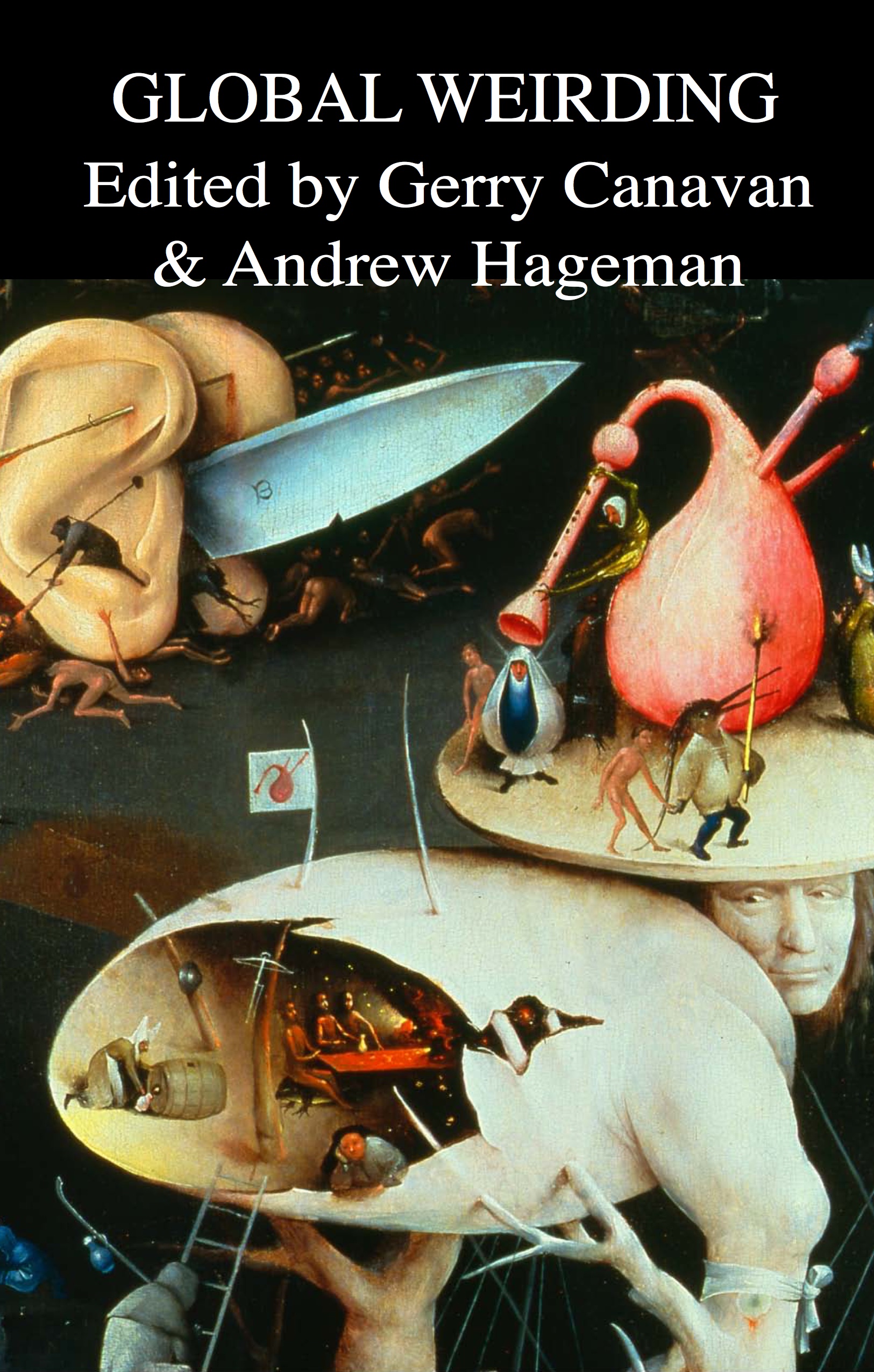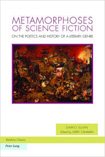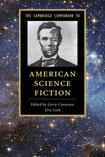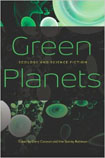Essential Weekend Viewing: Kim Stanley Robinson at Duke, 1.29.10
“Science began as a Poor Clare. Science was broke and so it got bought. Science was scared and so did what it was told. It designed the gun and gave the gun to power, and power then held the gun to science’s head and told it to make some more. How smart was that? Now science is in the position of having to invent a secret disabler of guns, and then start the whole process over. It’s not clear it can work. Because all scientists are Galileos, poor, scared, gun to our head. Power lies elsewhere. If we can shift that power… that’s the if. If we can shift history into a new channel, and avoid the nightmare centuries. If we can keep the promise of science, a promise hard to keep.”
—Kim Stanley Robinson, Galileo’s Dream, p. 524-525
Kim Stanley Robinson’s outstanding talk at Duke last week, “Science, Religion, and Ideology,” is now up at YouTube and embedded below. It’s truly essential viewing, not only for his fans but for anyone interested in either science fiction or the Utopian possibilities of scientific practice.
I’m a little bit religious about Stan’s novels, which may come across in my nervous and unusually fidgety (even for me) intro at the start of the clips. (I’d have probably just cut myself out altogether, but Stan outplayed me by taking a line from my intro and turning it into a recurring hook for the talk.) A full audio podcast is up at iTunesU. (Warning: the link is public, but launches iTunes.) The video clips are each embedded below.
I’ve refrained from a full transcript, but it’s a highlight quotable talk and so I’ve put a rough take on a few especially quotable moments.
This talk was part of the “Competing Cosmologies” event I helped organize with Priscilla, Barry, and Kevin , and came off very well, if I do say so myself. Meeting Stan and Nisi Shawl was especially a thrill, as I love the work of both. Video of Nisi and Bruce Lincoln’s talks will be online in some form soon; Michael Taussig declined to be filmed this time around. (UPDATE: Podcast versions of the Shawl and Lincoln talks are now also up at iTunesU.)
I have some video from the other event Stan did while he was here with our “Ecology and the Humanities” working group; I’ll try to get a few bonus clips from that event up over the weekend. (UPDATE: Click here.) My capsule review of Galileo’s Dream, for those who are interested, is here.
…And I also want to argue in the rest of this talk, try to make the case as Gerry has pointed out, preempted me in a way, or given away the game: science is a Utopian project; it began as a Utopian project and it has remained so ever since, an attempt to make a better world. And this is not always the view taken of science because its origins and its life have been so completely wrapped up with capitalism itself. They began together. You could consider them to be some kind of conjoined twins, Siamese twins that hate each other, Hindu gods that are permanently at odds, or even just a DNA strand wrapped around each other forever: some kind of completely imbricated and implicated co-leadership of the world, cultural dominance—so that science is not capitalism’s research and development division, or enabler, but a counterforce within it. And so despite the fact that as Galileo says that science was born with a gun to its head, and has always been under orders to facilitate the rise and expansion of capital, the two of them in their increasing power together are what you might call semi-autonomous, and science has been the Utopian thrust to alleviate suffering and make a better world.
…And yet, at the time, in its own internal workings the scientific community was having to deal with Rachel Carson and Silent Spring, and the notion that human-to-nature = master-to-slave was being replaced by the notion that human-to-nature was more like parasite-to-host. And at that point there were shifts going on that basically come down to the birth of the ecology movement, because parasites kill hosts all the time. E. coli, for instance, is a parasite outbreak that can kill off its hosts. And in essence parasites have to be good to their hosts if they want their livelihood to continue.
…There was a person who wanted to do Feng Shui at the South Pole. The South Pole had never been Feng Shui’d.
…And yet within the sciences the rule seems to come out of one of the oldest proverbs in our language: enough is as good as a feast. And this I think the science community is a physiological fact: that enough is even better than a feast, because a feast makes you sick, whereas enough is enough. And I was talking to a group of scientists about this, and I must say the scientific community is very uncomfortable with this line of my talks—they don’t like this—but one of them said “Enough is a bad word. That’s a bad word in America. Enough sounds like not enough. You should change it to Goldilocks, where there’s too little, there’s too much, and then there’s just right. And what you want is just right. And you can easily have too much.”
So I thought, okay, Goldilocks. I’ll change it always and mention that it’s not only that enough is as good as a feast, but enough is just right.
…So there, to end, and this is the only time I’ll mention it, you get science as a religion. It’s a religion in the sense of religio, it’s what binds us together. It’s a form of devotion: the scientific study of the world is simply a kind of worship of it, a very detailed, painstaking, and often tedious daily worship, like Zen. So you can think of science as a religion, and a devotion to something you can easily regard as miraculous: the Big Bang, out of a single singularity, out of a geometrical point of infinite mass, that has a inflationary period where at 10^-33 seconds after the beginning of everything suddenly there was an expansion of 10^30 time. This is our current explanation of our universe; if that’s not sounding miraculous to you I don’t know what would sound miraculous.
…The notion that we are the most sophisticated culture ever, because we’re more sophisticated than the Victorians or the early moderns etc., we immediately think, “Oh, it’ll never get better than this.” But it only take a little bit of extrapolation to think that oh, we’ll be looking back at the 2010s and thinking “They had just discovered the laptop and lost their minds.” It’s like in the discovery of the telephone; for a while there there was the euphoria of the telephone, and everyone had to call everyone, and we’re in that kind of moment for the Internet—but eventually you get past these technologies and we’re just back to people doing things.
…Government is a site of contestation, science, in a way, is also, in terms of aiming it towards one or the other. If the biomedical budget was $700 billion and the defense budget was $5 billion—and there are countries in the world where that proportion obtains. In the social democracies of North Europe they don’t spend a whole lot of money on a defense budget and they do a lot of health research. So I don’t think I’m being unrealistic, I’m trying to describe the situation in a way that gives us things to do…










Yay! Thank you!
Leigh Fullmer
February 5, 2010 at 12:16 pm
Any update on when we might get to see your Polygraph interview with KSR? Looking forward to that.
Looking forward to these, too, but will wait until I have time to pay attention properly…
Stephen Frug
February 5, 2010 at 10:23 pm
I was going to post the early draft, but I think I’ll just hold off for the full version. It won’t be too much longer. A few weeks? We’re pretty happy with it.
gerrycanavan
February 5, 2010 at 10:24 pm
Thank you for posting these videos. Thought provoking although I think Mr Robinson misses the mark regarding the dynamics between science, capitalism and government.
I would argue that sciences role is to turn data into knowledge. Capitalism’s role is to turn knowledge into commercial value. Governments role is to adjudicate the rules of engagement.
Unfortunately the real power and the real source of evil isn’t capitalism as Mr. Robinson seems to imply.
Unchecked evil (its early stages) usually seems to emanate from government. Neither science nor capitalism wants war and destruction. Governments sometimes do.
He correctly points out that mainstream economics is a false science. But, as an alternative I would ask you to investigate Austrian Economics, which treats economic transactions as the culmination of individual preferences.
Dan Murray
February 6, 2010 at 10:18 am
Dan, thanks. While I don’t want to ventriloquize Stan (or anyone else for that matter), Austrian economics would probably seem to him to be pretty deeply problematic (as it does to me). What we lose when we go that ideological route is the possibility of coordinated, cooperative, non-economized collective action — government in the hoped-for and often unrealized sense of democracy — which is one of the only levers we have that might be used to counter global capitalism.
Which, I would offer, *does* need to be resisted. Capitalism certainly wants destruction — specifically the destruction of the ecosphere, as well as the lives of its workers — and indeed it very often wants war, as long as it’s a war someplace far away from corporate headquarters for which it can supply the bullets. Government, in the terms of this talk at least, is the middle term in a tug of war between capitalist and anti-capitalist impulses; by advocating a hands-off approach to governance, as an ideology Austrian economics surrenders the world to capitalism without firing a shot.
Naturally, I expect you to have a rather different take on things, but this is where I”m coming from.
gerrycanavan
February 6, 2010 at 11:24 am
[…] And Pharyngula linked to the Kim Stanley Robinson talk I posted yesterday, bringing it a lot of new eyes and inaugurating an already rather lengthy discussion at his site […]
Saturday! « Gerry Canavan
February 6, 2010 at 12:01 pm
When one says science is a utopian project, why utopia are we referring to? What utopia is the scientist referring to…I think it would be rather different from the humanist version of utopia.
Scientists may worship particular modes of thought in terms of privileging, for example, solipsism over untrackable results…they may even obssess over the science they do (I presume Stan means the ‘hard’ sciences here rather than science as knowledge) but ‘worshipping’ is less to do with science as an ontology/epistemology than with the proclivity or narrowness of a particular individual scientist, or group of scientists…
And in terms of science and capital…one has to be careful to differentiate between the institutions of scientific practice that are dependent on capital (industries, govt funding that come from taxes) to endowment) individual belief of a practising scientist, or the scientific paradigm..we still have the amateur scientist (especially in astronomy) though I admit it’s getting harder to separate economics from scientific production in the era of ‘expensive’ science that can no longer be easily performed in the kitchen of one’s home.
Category of meanings are important when we want to use such value-laden terms.
Clarissa Lee
February 6, 2010 at 12:35 pm
Thanks for the great stuff. Any chance of getting a direct to mp3 link? Being forced to download itunes to listen to this is rather odious.
Michael
February 6, 2010 at 1:23 pm
Michael, I know, but I don’t have the space or bandwidth to put it up. iTunesU is free.
gerrycanavan
February 6, 2010 at 1:25 pm
He correctly points out that mainstream economics is a false science. But, as an alternative I would ask you to investigate Austrian Economics, which treats economic transactions as the culmination of individual preferences.
Which is one reason among several why it’s total crap – even more removed from science than the neoclassical mainstream. Both treat human capabilities and preferences as a given, which they are not; both treat the non-human world as an infinite, passive, indefinitely maleable grab-bag from which we can take anything we want, which it is not; both are cavalier about the evidence on how people actually behave, gathered in economic psychology, behavioural economics, and increasingly neuroeconomics – but Austrian economics actually boasts about this.
Knockgoats
February 6, 2010 at 3:59 pm
For those without iTunes, follow the instructions at
http://www.fritscher.ch/blog/2009/05/13/browsing-itunesu-without-intalling-itunes/
Simon
February 6, 2010 at 10:36 pm
[…] here’s a bonus Kim Stanley Robinson video from the Polygraph/FHI event the night before the “Science, Religion, Ideology” talk. (I’m very sorry I couldn’t put up more, but I found this event was actually […]
Bonus Kim Stanley Robinson Video « Gerry Canavan
February 8, 2010 at 2:51 am
Material added at KimStanleyRobinson.info
Thank you!
http://www.kimstanleyrobinson.info/index.php?option=com_content&view=article&id=100
Kimon
February 8, 2010 at 4:57 am
[…] O prelegere sustinuta de Kim Stanley Robinson la Universitatea […]
Links « Blog de carti
February 8, 2010 at 5:22 am
[…] like Zen,” award-winning science fiction writer Kim Stanley Robinson said during a recent talk at Duke University. “So you can think of science as a religion, and a devotion to something that you can easily […]
Kim Stanley Robinson Equates Science and Religion - Science and Religion Today
February 8, 2010 at 12:39 pm
[…] The entirety of the other talk is available here. […]
Stephen Years Dot Com » “We Are Living in a Science Fiction Novel We All Collaborate On”
February 8, 2010 at 8:46 pm
[…] [Gerry Canavan via Boingboing] […]
“Living in a science fiction novel” «
February 8, 2010 at 10:21 pm
This is a fantastic talk – thanks for uploading it, and for helping set everything up!
Adrian Hon
February 11, 2010 at 5:00 am
Thank you for this!
A couple funny random coincidences (adherences to subtle mathematics?):
1. I found your blog through an old (2006) blogging meme, which Big Dumb Object had contributed to. When I clicked on BDO yesterday, there was your Robinson bonus video, which was so exciting I followed it here.
2. Not knowing who KSR is, this morning I googled him and discovered that today (March 23) is his birthday.
Send him flowers?
Fresca
February 23, 2010 at 11:52 am
P.S. Whoops—I got that date wrong!
We are in February, not March.
Still plenty of time to order flowers…
Fresca
February 23, 2010 at 11:53 am
[…] A bunch of video clips from KSR’s lecture […]
Competing Cosmologies: Kim Stanley Robinson’s “Science, Religion, Ideology” talk | Javen Blog
April 5, 2010 at 6:18 am
[…] of other great stuff, was provided by Gerry Canavan, co-organizer of the event. Please check out Gerry’s blog and watch KSR’s whole […]
“We Are Living in a Science Fiction Novel That We All Collaborate On” | between drafts
June 15, 2010 at 10:39 am
[…] via Essential Weekend Viewing: Kim Stanley Robinson at Duke, 1.29.10 « Gerry Canavan. […]
Kim Stanley Robinson on Science and Religion | the bad days will end
August 25, 2010 at 12:48 am
[…] found here; video from Kim Stanley Robinson’s January visit to Duke University can be found here and […]
Science, Justice, Science Fiction: An Interview with Kim Stanley Robinson « Gerry Canavan
September 13, 2010 at 12:22 am
[…] “On the Horizons of Epistemology and Science,” which has some nice affinities with the Kim Stanley Robinson talk from last January as well as what he has to say in the Polygraph interview. Here’s a excerpt from Suvin […]
Brecht on the Future and Suvin on Science « Gerry Canavan
October 13, 2010 at 3:07 pm
[…] from a Franklin Humanities Institute/Polygraph event on January 28, 2010 which preceded the “Science, Religion, Ideology” lecture presented by Robinson in Competing Cosmologies, Effecting Worlds: Intersections of […]
An Introduction to the Territory «
October 19, 2011 at 7:47 pm
Thank you.
Hank Roberts
December 12, 2015 at 9:27 am